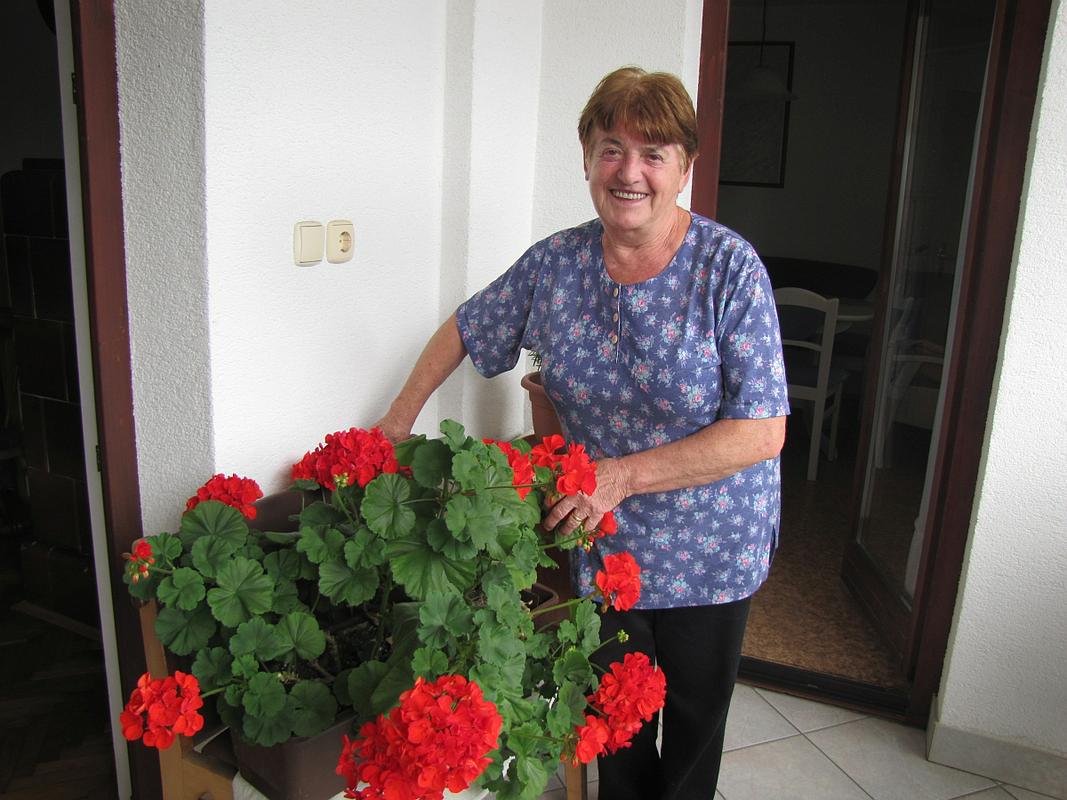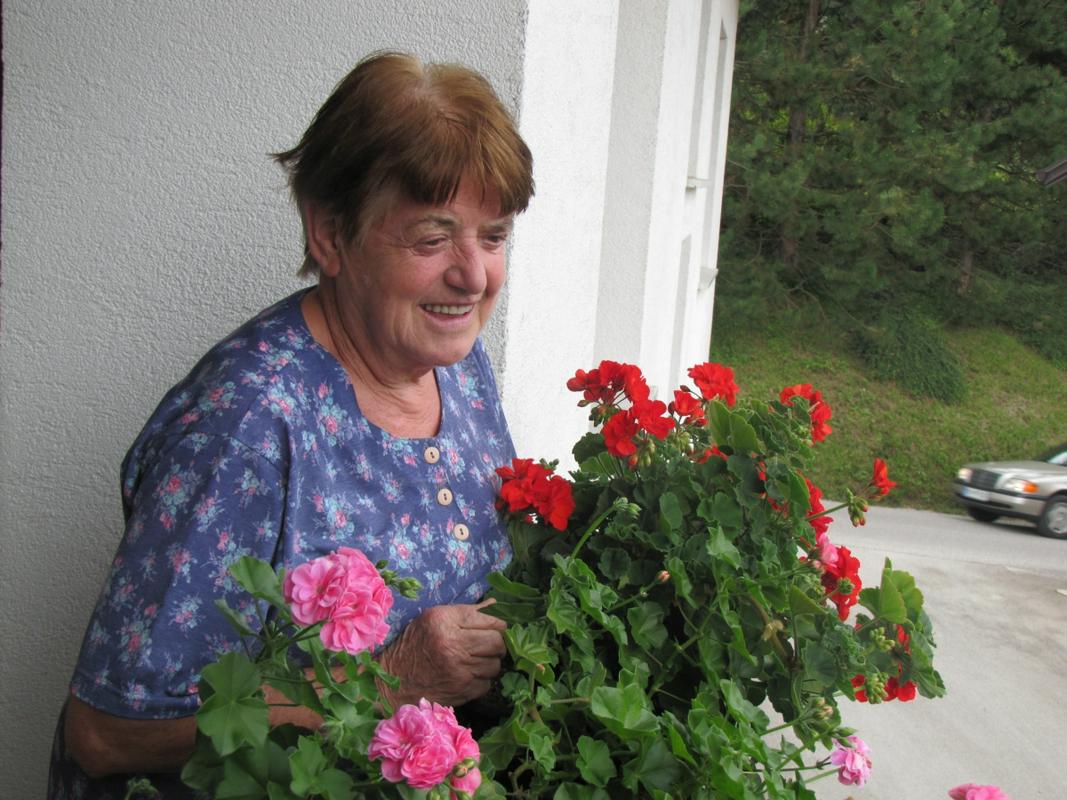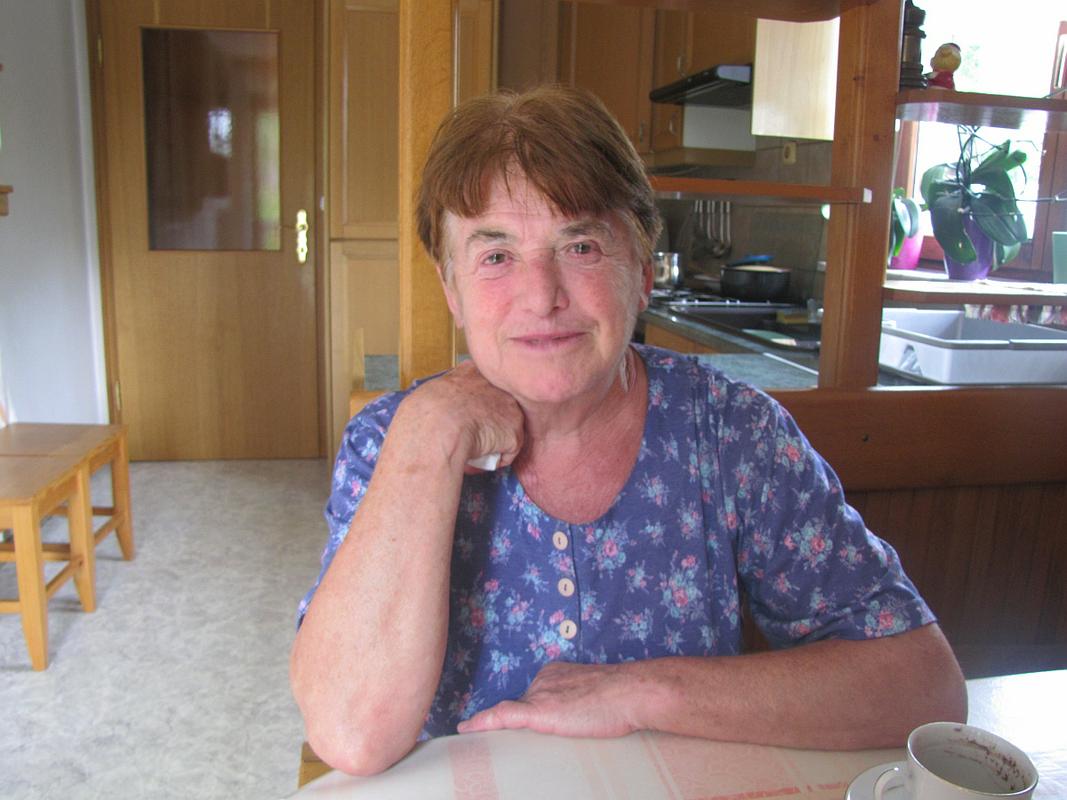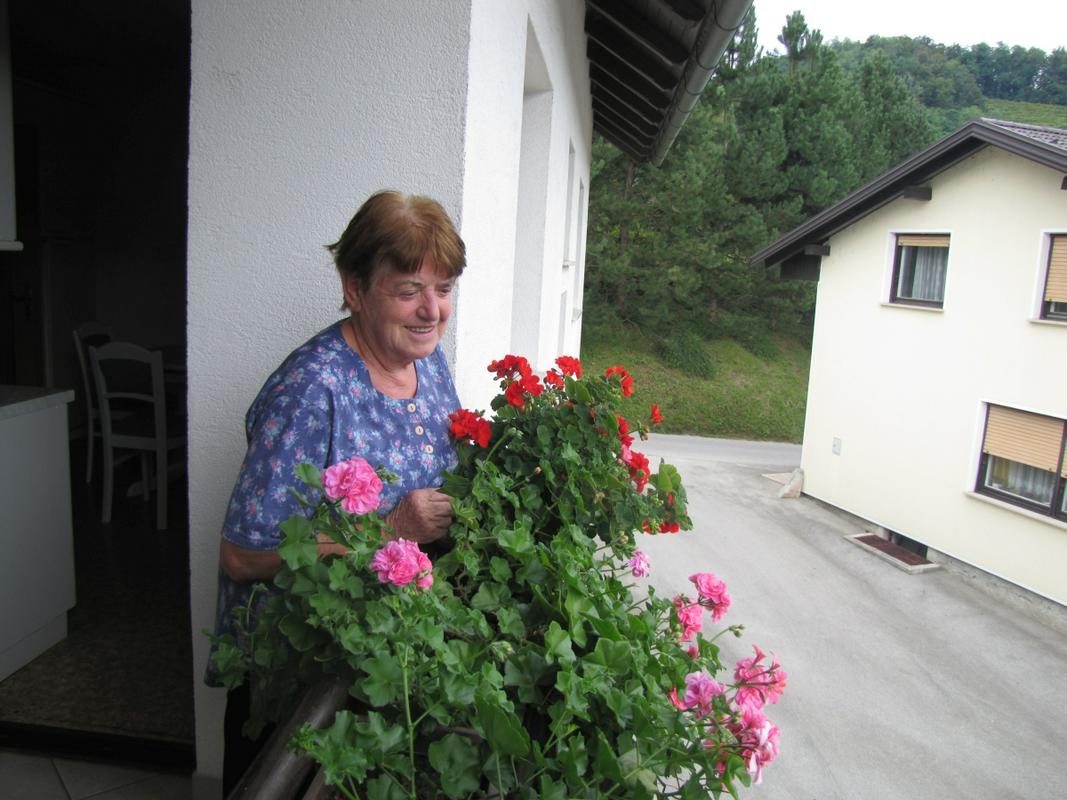

I meet a former pupil, a grown-up man today, and I can still remember how he climbed on my lap while reading at school. The children used to come to me to caress, especially the ones who missed the loving touch at home.

I could say I was afraid of retiring. I didn’t know how it would be for me after the 1st of September, would I go to the school and just watch the pupils or would I leave in order not to see them. I felt bad and I wanted to return to the school.

She spent 34 years teaching at the primary school in Raka, where she introduced hundreds of first-graders to the world of knowledge. Due to her kindness she was a much-loved teacher. She herself enjoyed the teaching profession.
Rezika has an interesting life story: a true city girl from Ljubljana headed to a village in the region of Dolenjska for a one-month teacher’s internship. There she later met her future husband. "I had no idea where Raka was. Together with a school friend, who had to go Veliki Trn (near Raka), we went to Miklošičeva street where the Izletnik travelling company had an office, to ask where those places were and how we could get there," Rezika remembers the beginnings of her teaching career.
She spent 35 years in school. She has been retired for 20 years now, but admits that she did feel awful when she had to retire, as she loved teaching. She spends her retirement days reading and visiting her daughter and her family, which have been a great support after the death of Rezika's husband. When asked about today's teaching in class, she smiles and says: "I couldn't be a teacher today. I know nothing about computers which are an important teaching accessory in school."
You were born in Ljubljana.
My home was in Ljubljana, in Savlje. Today that's Bežigrad. Bus number 14 used to pass by our house. We were 11 children and I was the third child and first female. I helped my mother a lot and took care of my younger siblings. I had a lot of practice with small children, I took care of three younger brothers and three younger sisters. Mom used to go out for errands so she would leave me alone and tell me to just do my best. It was as if I had my own kindergarten at home.
How do you remember your first days in school?
When I started going to school there were no notebooks. One of my school friends, Silva, had a father that worked for the railway. I remember that one day in 1948 he brought us some notepads which were all written on the front side but empty on the back. And so we wrote on the empty sides. I remember how we used to write Russian, because we had Russian language classes then. But that was only for one year. There was a political dispute between Yugoslavia and the former Soviet Union, so we stopped learning Russian and we removed all of Stalin's pictures. A nice example of how everything changes.
In Ljubljana you went to teacher’s college.
I really wanted to go to the teacher’s college, but was afraid because they had an entry exam. The building was on Resljeva street, next to the Ledina primary school, where we then also performed. It was said that there would be three departments and that they would only accept 100 applicants. We went together with a friend to see the list of those accepted. My heart beat so fast out of fear, and then I felt so relieved when I saw that I was accepted. Otherwise I would've surely become a kindergarten teacher, which I would have also enjoyed. My professor always told me to go to teaching school and that I could always work in a kindergarten if I failed. I guess he appreciated the teaching profession more than working in a kindergarten.
Then I attended the teaching school for five years. The system changed when I was enrolled so we had five years instead of four. Later, after I became a mother and had already been teaching for some years, I also got my teacher training college degree. I started studying in 1971. Instead of two years in took me four years to pass all the exams. I would often take my children with me to Ljubljana and leave them with relatives while I had lectures. But I persisted. I wanted to have all the degrees so that I wouldn't be left without a job. I wanted to be independent and have my own money.
Were you all females at the teaching school?
No, we also had 11 classmates, who came from all across Slovenia. We had classes A, B and C. A was a mixed class, so was B, and in C class there were only females. We used to call them "Cecke". I remember how I got my first fountain pen. One of my classmates, who was from Medana, brought fountain pens in class which were smuggled over from Italy. We bought our first fountain pens from him.
I guess you lived at home, but the majority probably lived in student dormitories, right?
Everyone lived in the dormitories, at the Ivan Cankar dormitory and at the Anica Černejeva dormitory. Everyone except me, and two others who also lived at home. But I did envy them. They would tell us about their adventures, while I had to go home and do housework. They went to dances, they went to the Narodni Dom… I still have a friend, Ankica, who writes about her memories even today.
How did you come to Raka?
In our fifth year we had to have mandatory teaching practice. Our professor made lottery tickets and we got to draw who would go where. One got to go to Hrušica at Jesenice, others went elsewhere, and I got Raka. My school friend got Veliki Trn, which is really close to Raka. What a coincidence that was! First we went to Miklošičeva street where the Izletnik company had an office, to ask where those places were and how we could get there. We then went on the train. My father took me to the station from Savelj by bicycle, I sat on the front bar while he rode. He also carried my suitcase up into the wagon, and off I went. With the train up to Sevnica, and then onwards with a bus to Raka.
I asked somebody on the bus, how I would now when we arrive in Raka. He told me to pay attention and that when I would see a church with two bell towers it would mean that we were in Raka. And that's how I arrived in Raka in February. I still remember very well how cold it was and how everything was frozen.
I first went to the school where I was welcomed by the school representative. He then pointed me in the direction of the house, which would be my home for one month. That's how I came to the house of the Gabrič family, which also had an inn. I did my teaching practice there for one month. I prepared my lectures in the inn. I was always closely watched by the curious local young boys. Going to the inn was an important social event for there was nothing else at that time, no telephones and no TVs. They would socialize in the inn and smoke so much at times, that you could hardly see inside. Oh, how happy I was to go to school every day.
After the one-month internship I had to return to Ljubljana to do the matura exam. I remember walking up that hill, and saying to myself, how I would never again return to this place. But never say never! With Jože, the son of the owner of the inn, we kind of liked each other. When I returned to Ljubljana he wrote me letters. And that's how our romance began. However I did later learn, that I was not the only one to whom he wrote letters. (Laughter.)
But you did not immediately return to Raka.
The municipalities gave out one-year scholarships and I received one from the Šentvid municipality in my fifth year. That's how I got my first employment, in Utik in Vodice. I taught every day, except on Thursdays when we had a free day. I then bought my first bicycle and was able to visit my family 20 km away. My brother took a bank loan to help out. I was so happy when I got the Rog bicycle. With that bicycle I later also arrived in Raka. It was my wedding dowry. My husband later borrowed it many times.
What did classes look like then?
In Utik I first taught one class for three hours, in between I had lunch break, and then the next three hours I took over another class. We could have had combined classes, with some pupils from two age groups attending the same class together, but the system was not like that then. We worked in shifts. We had a blackboard, pupils already had notebooks and textbooks and there were no other teaching tools. It was a branch school and pupils later went to Vodice. We were only three teachers.
One never knows what life has in store – as a city girl you then ended up in Raka, in a place you never thought you would return to.
We wrote letters to each other with my future husband – we didn't pay each other visits – and that's how our romance developed. My teacher colleagues were very protective – I remember how they once advised me, when it was the 25th of May, to go to Dolenjska and check if he really was well-behaved. So I really went by bus and it turned out that he really was diligent. He was working. (Laughter).
I then became pregnant and at the school they told me that I had already served my one year. I was free and luckily there was a job opening in Raka and so I came to Raka. It would be difficult to find a job today. I was lucky then. And that's how I came to the Gabrič family. There were no kindergartens at that time, so in the mornings I helped the mother while she was in the inn and looked after the children, while in the afternoon I studied while my mother-in-law took care of my children. We had classes until 5p.m. so I always rushed home immediately after.
My own family was very sad that I married so far away. My father cried. But what could one do, our love was big and I never hesitated, especially not after I became pregnant. I was so much in love that I would have even gone to Africa if had to. One of my aunts wrote me in a letter, that every cloud has a silver lining. And I still strongly remember those words.
How did you prepare for class at that time?
For every day of teaching I had to prepare and write out my preparations. In the back of my head I always carried the thought that I had to prepare: what kind of handouts and exercises I would give and similar things. The way of teaching then was more frontal, pupils wrote down my words. Today teaching is more adjusted to individual pupils and their abilities.
And what were the children like?
Children went to school on foot. They had a lot of house chores and were very playful, as all children are. In the past, children were allowed to stay home during grape harvest. I taught lower classes and all the children were small and truly kind. They told about was happening at home and we heard stories about calves and other animals. Events on their farms meant a lot to them and they were proud to tell us about those things.
You were a teacher to many generations and your pupils were also children of your former pupils?
That was very nice. It often happened I saw the mother or father in a pupil and mixed up their names. One mother’s name was Barbara and her daughter was Katarina, but she resembled her mother so much, I often called her Barbara. When I meet the children, I still think of them as mine. I meet a former pupil, a grown-up man today, and I remember how he climbed on my lap while reading at school. The children used to come to me to caress, especially the ones who missed the loving touch at home. Today I am often invited to school reunions. We look at photos and remember. Some pupils are hard to recognize, while others stay the same.
Were you afraid of retiring?
I could say I was afraid of retiring. I didn’t know how it would be for me after the 1st of September, would I go to the school and just watch the pupils or would I leave in order not to see them. I felt bad and I wanted to return to the school. But on the other hand, I don’t have so much energy anymore and new methods came in. In the last years, I notice that my younger colleagues are different than my generation. When the bell rang, we went immediately into the class, while they just stood there talking in the school corridor.
You passed the joy of teaching onto the children, right?
I never thought that my daughter would be a teacher. She now teaches at the high school of economics. She has the patience required in this profession. High school pupils are difficult to teach, patience is truly needed.
Do you keep up to date with the news in the education field, with the changing class methods?
It is very different today, a teacher today has much more responsibilities. Children have overloaded timetables. I know it is hard. Teachers have to carry out all the required material and the children need to absorb it. Children today are different, having television and radio, they know much more, but they are much more restless at the same time. They have difficulties at concentrating because there are so many impulses around them, disturbing their attention.
I meet a former pupil, a grown-up man today, and I can still remember how he climbed on my lap while reading at school. The children used to come to me to caress, especially the ones who missed the loving touch at home.
I could say I was afraid of retiring. I didn’t know how it would be for me after the 1st of September, would I go to the school and just watch the pupils or would I leave in order not to see them. I felt bad and I wanted to return to the school.


































































